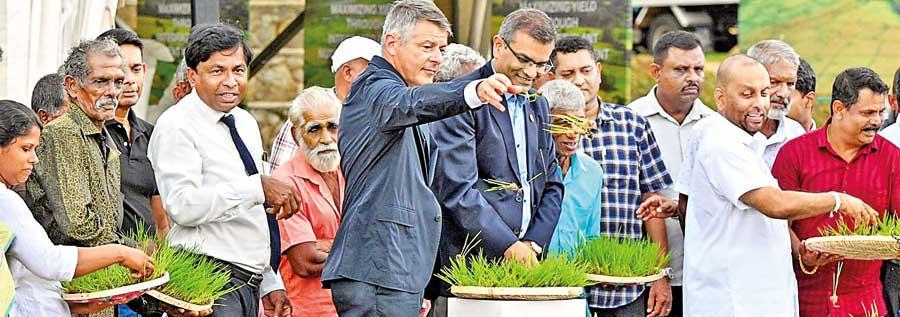Reply To:
Name - Reply Comment

The Food and Agriculture Organization of the United Nations (FAO) together with the European Union (EU) have officially launched a new programme to strengthen food security in Sri Lanka by boosting the productivity and sustainability of the paddy cultivation sector.
The four million Euro (approximately Rs.1.5 billion) initiative funded by the EU was initiated at an event held at the Bataatha Agro Technology park in Hambantota under the auspices of the Minister of Agriculture Mahinda Amaraweera, EU Ambassador to Sri Lanka Denis Chaibi and FAO Representative in Sri Lanka
Vimlendra Sharan.
Implemented by FAO with the support of the Ministry of Agriculture and the Mahaweli Authority, the programme targets 71,000 smallholder paddy farmers and 1,200 paddy seed farmers across seven districts including Polonnaruwa, Badulla, Ampara, Matale, Puttalam, Kurunegala and Hambantota districts who were severely impacted by the recent economic crisis.
Speaking at the event, which saw the official start of the farmer field schools EU Ambassador to Sri Lanka Denis Chaibi said, “With this new action, we want to help farmers not only to grow more, but most importantly to grow better so that they can increase their production and incomes, but also protect the environment around them. We hope that together with FAO and the Government of Sri Lanka we can gradually promote a transition towards greener and climate-smart agriculture.
Transition that produces sufficient amount of food, while protecting the planet and its people.”
The recipient farmers will receive material and technical support to transition from traditional cultivation methods into climate-smart, modern farming techniques. The eligible paddy farmers cultivating up to 0.5 ha of land will receive 50 kg urea fertilizer and necessary tools to enhance efficiency of fertilizer use. 3,820 tonnes of urea fertilizer procured by the programme were already handed over to the Ministry of Agriculture to be distributed among selected smallholder paddy farmers and paddy seed farmers.
Paddy seed farmers supported through the programme will also receive locally produced, high quality paddy seeds alongside material support such as parachute trays to improve efficiency and profitability of cultivation methods. Furthermore, all recipients will be enrolled in farmer-field schools to improve knowledge sharing on modern techniques such as the Integrated Plant Nutrient Management (IPNM) strategy to boost efficiency and reduce dependency on the use of chemical fertiliser.
Agriculture Minister Mahinda Amaraweera expressed his appreciation to the FAO and the EU for the implementation of a holistic programme aimed at improving the sustainability of Sri Lanka’s paddy sector.
“Our paddy farmers underwent significant challenges over the past few years. This support we received from FAO and the EU is a testament to their perseverance during the tough times, for which we are thankful. These inputs and knowledge sharing will no doubt elevate the quality of rice production and the livelihoods of Sri Lankan paddy farmers.”
“This programme marks an important milestone in FAO’s work in Sri Lanka over the past year – the shift back into development from the emergency response. We are grateful for the support we have received from the EU to implement this programme, which aims to address some of the longstanding concerns in the local paddy sector, to reach better production, leading to better nutrition, a better environment and improve food security for all Sri Lankans,” FAO Representative in Sri Lanka, Vimlendra Sharan said.
EU and FAO will continue to work closely with the government of Sri Lanka and key partners to support the recovery of the agriculture sector while building resilience and sustainability into the sector to increase yield and profit for smallholder farmers as the sector recovers.